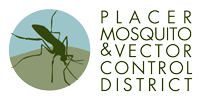Officials at the Placer Mosquito and Vector Control District (PMVCD) caution residents of the presence of the Lyme disease organism in local ticks. Results from surveillance activities for Ixodes pacificus, the western black-legged tick, have shown an increase in tick abundance in the foothill areas of Placer County, as well as ticks infected with Borrelia burgdorferi, the organism that causes Lyme disease.
The western black-legged tick, which primarily feeds on deer and other grassy woodland animals, is the primary vector for Lyme disease in Placer County, and numbers are usually elevated in the months between December and May. Dr. Mary Sorensen, entomologist for PMVCD, reports that these results are not unusual. “These ticks thrive in high-moisture weather, so we can expect more tick activity during the rainy season,” she states. The infected ticks were collected in the middle of November at a few nature trails in the foothills area. “It is important to note that, although these infected ticks were collected at a handful of sites, the risk of infected ticks exists throughout the foothills region”, Sorensen continues. Officials urge caution when in high-risk tick areas.
The good news is, infection with the Lyme disease organism is preventable through some simple protective measures. These include:
- Wearing light-colored, long pants and long-sleeved shirts
- Applying a repellent, such as DEET, with a high enough concentration that is registered for use against ticks (>20%)
Additional protective measures are:
- Stay in the middle of the trail when hiking. Avoid trail margins, brush and grassy areas.
- Inspect yourself frequently for ticks while in tick habitats. Once out of tick habitat, thoroughly check your entire body for ticks up to three days after being in tick areas. Parents should examine their children, especially on the scalp, hairline and skin folds.
- Bathe or shower as soon as possible after coming indoors to wash off and more easily find ticks that are crawling on you.
- Inspect your pets for ticks hitchhiking a ride into your home after they come in from tick habitat.
For more information on ticks in Placer County, contact the Placer Mosquito and Vector Control District at (888) 768-2343






